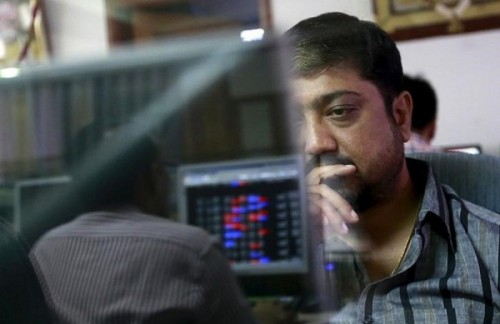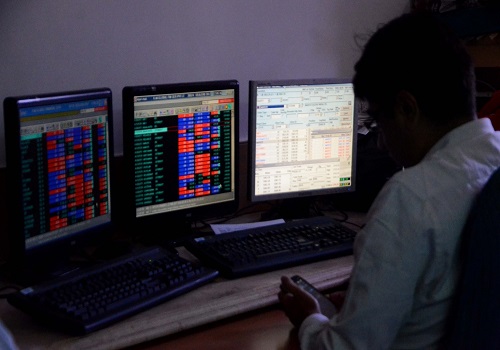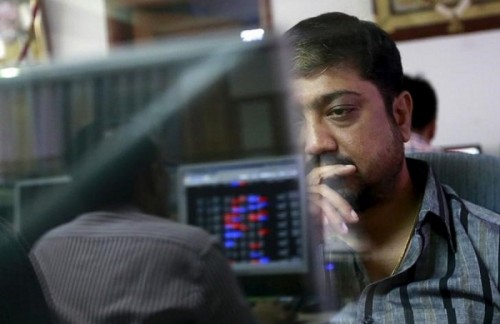Key gauges end lower amid volatility

Follow us Now on Telegram ! Get daily 10 - 12 important updates on Business, Finance and Investment. Join our Telegram Channel
Indian equity benchmarks ended lower in highly volatile trade on Tuesday due to selling pressure in metal, utilities, power and realty stocks. The markets opened on a negative note amid weak global cues and remained volatile through the day, oscillating between gains and losses. Traders were concerned with a private report that Indian retail inflation likely surged to an 18-month high in April, largely driven by rising fuel and food prices and staying well above the Reserve Bank of India's upper tolerance limit for a fourth consecutive month. There was some cautiousness as Meghalaya Governor Satya Pal Malik said increasing inflation and unemployment are going to create a situation of crisis in the country but no leader is ready to speak on the issues.
However, key gauges managed to trade in green terrain in afternoon deals, taking support from Union Finance Minister Nirmala Sitharaman’s statement that with licence quota raj prevailing during the 70 years of Congress regime, the policy change brought in by the central government under Prime Minister Narendra Modi has created new opportunities for the private sector by allowing them to manufacture products that were normally made by public sector units (PSUs). Some support also came with private report stated that improving business sentiment has boosted the overall hiring demand which witnessed a 15 per cent year-on-year growth in April, led by banking, financial services and insurance sector as well as recovery in the retail sector. However, benchmarks failed to hold on to the green in volatile trade, as traders are concerned that central banks of key developed economies could resort to more rate hikes going ahead to temper rising inflation, which could hurt growth and trigger more foreign fund outflows from emerging markets, including India.
On the global front, European markets were trading higher as investors sought bargains following four straight days of steep losses on fears of a recession and aggressive policy tightening by the U.S. Federal Reserve. Asian markets ended mostly lower on Tuesday following the continued sell-off on Wall Street overnight, as traders remain concerned about slowing growth, soaring inflation and prospects of tighter policy moves by global central banks to combat persistent inflation. Worries about the impact of the Ukraine war, and the ongoing lockdown in Shanghai are also weighing on market sentiment.
Back home, insurance industry stocks were in focus as latest data released by the Life Insurance Council showed that new business premiums (NBP) of life insurance companies jumped 84 per cent year-on-year (YoY) in April, propped up by 141 per cent increase in initial public offering-bound insurance behemoth Life Insurance Corporation (LIC) of India’s NBP. Metal stocks were in watch as Crisil in a report stated that steel prices, which have been on a song for the past two years, are finally set to correct on weak seasonality, and may trade at around Rs 60,000/tonne by the end of the current fiscal year, down from the Rs 76,000/tonne peak it scaled last month.
Finally, the BSE Sensex fell 105.82 points or 0.19% to 54,364.85 and the CNX Nifty was down by 61.80 points or 0.38% to 16,240.05.
The BSE Sensex touched high and low of 54,857.02 and 54,226.33, respectively. There were 12 stocks advancing against 18 stocks declining on the index.
The broader indices ended in red; the BSE Mid cap index fell 1.98%, while Small cap index was down by 2.11%.
The only gaining sectoral indices on the BSE were Bankex up by 0.57%, FMCG up by 0.26% while, Metal down by 5.62%, Utilities down by 4.57%, Power down by 4.33%, Realty down by 2.96%, Basic Materials down by 2.67% were the losing indices on BSE.
The top gainers on the Sensex were Hindustan Unilever up by 3.24%, Asian Paints up by 2.46%, Indusind Bank up by 2.40%, Ultratech Cement up by 2.22% and Maruti Suzuki up by 2.14%. On the flip side, Tata Steel down by 6.95%, Sun Pharma down by 2.74%, NTPC down by 2.33%, Titan Co down by 2.15% and Bajaj Finance down by 1.80% were the top losers.
Meanwhile, Union Finance Minister Nirmala Sitharaman has said with licence quota raj prevailing during the 70 years of Congress regime, the policy change brought in by the central government under Prime Minister Narendra Modi has created new opportunities for the private sector by allowing them to manufacture products that were normally made by public sector units (PSUs).
She said the previous regimes had centrally planned schemes with regulation of limited manufacturing opportunities and the aspirations of core industries were clipped despite their potential to boost manufacturing in the country.
She said though good things happened after opening up of the economy in 1991 during Congress period, the policy change undertaken by the Modi government provided opportunities to private sector, particularly MSMEs, and added that barring a few strategic sectors, the sector can work together with PSUs in defence, space and atomic energy sectors.
The CNX Nifty traded in a range of 16,404.55 and 16,197.30. There were 16 stocks advancing against 34 stocks declining on the index.
The top gainers on Nifty were Hindustan Unilever up by 3.03%, Asian Paints up by 2.85%, Indusind Bank up by 2.38%, Ultratech Cement up by 2.30% and Eicher Motors up by 2.18%.On the flip side, Coal India down by 7.54%, Tata Steel down by 7.27%, ONGC down by 7.04%, JSW Steel down by 5.14% and Hindalco down by 4.88% were the top losers.
European markets were trading higher; UK’s FTSE 100 increased 44.86 points or 0.62% to 7,261.44, France’s CAC increased 56.23 points or 0.92% to 6,142.25 and Germany’s DAX increased 192.25 points or 1.44% to 13,572.92.
Asian markets ended mostly lower on Tuesday amid worries that higher rate increases in the United States might stall global growth. Japan stocks ended lower as losses in the Gas & Water, Construction and Services sectors led shares lower. Hong Kong stocks fell after a one-day holiday, playing catch-up on Wall Street. However, China's Shanghai Composite index ended higher after the Chinese government announced rent cuts and other aid for small businesses in a new effort to boost economic growth. The yuan has found some stability after earlier slipping to a new 18-month low, as China’s benchmark money market prices are trading with 16-month lows.
Above views are of the author and not of the website kindly read disclaimer










Tag News

Weekly Market Analysis : Markets strengthened recovery and gained nearly 2% in the passing w...













